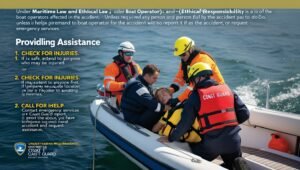
What Is the First Action Required of a Boat Operator Involved in a Boating Accident?
Boating is a cherished pastime for many, offering moments of tranquility and adventure on the water. However, like any activity involving vehicles, accidents can occur. Knowing the appropriate actions to take in the event of a boating accident is crucial not only for the safety of all involved but is also often required by law. As a boat operator, understanding your responsibilities in these situations can help ensure that you are prepared to act effectively and efficiently when it matters most.

Immediate Safety and Assessment
The first priority following a boating accident is to ensure the safety of all individuals involved. This includes:
1 Stop the Boat
As soon as a collision or accident occurs, it’s imperative to stop your boat. Continuing to move could exacerbate the situation or lead to further accidents. However, ensure that you stop in a safe location where you can avoid further danger to yourself and others.
2 Assess the Situation
Quickly and carefully assess the situation. Determine the extent of the damage to your vessel, the other vessel (if another boat is involved), and any potential injuries to passengers or crew members. Be vigilant for any signs of fire, sinking, or other immediate dangers.
3 Ensure Personal Safety
Before taking any action, ensure that it is safe to do so. If there is a risk of explosion or sinking, or if the environment is otherwise dangerous, prioritize moving to a safe area if possible. Always keep a life jacket on and ensure all passengers do the same.
Providing Assistance
Under maritime law and ethical responsibility, boat operators are generally required to help any person affected by the accident unless it is unsafe to do so.
1 Check for Injuries
If it is safe, attend to anyone who may be injured. This may include providing basic first aid or, if more serious, preparing to evacuate them to a safer location or awaiting emergency services
2 Call for Help
Contact emergency services or the Coast Guard to report the accident and request assistance.
Legal Responsibilities
Understanding the legal requirements for boat operators is crucial to avoid potential penalties or legal action.

Exchange Information
Like a car accident, you are required to exchange information with the other parties involved. This typically includes your name, address, and vessel identification.
2 Report the Accident
Most jurisdictions require that you report the accident to local authorities or a specific governing body, such as the Coast Guard. The requirements for reporting can vary depending on the severity of the accident, including factors such as injuries, fatalities, or significant property damage.
3 Preserve the Scene
If possible, try to preserve the scene for investigation. This can help authorities understand the cause of the accident and assess any legal implications.
Preventative Measures
While knowing how to respond to an accident is important, taking steps to **prevent accidents** in the first place is even more beneficial.
1 Regular Maintenance
Ensure your boat is well-maintained and regularly inspected. Faulty equipment or neglected maintenance can lead to dangerous situations on the water.
2 Adequate Training
Before heading out on the water, ensure that you and anyone operating the boat have received proper training. Understanding the rules of the water, navigation, and emergency procedures can help prevent accidents.
3 Follow Boating Laws and Regulations
Adhering to local and international boating laws and regulations can significantly reduce the risk of accidents. This includes observing speed limits, keeping a safe distance from other vessels, and avoiding operating under the influence of alcohol or drugs.
Conclusion
Being involved in a boating accident can be a frightening experience, but knowing the appropriate steps to take can help mitigate the impact. By prioritizing safety, providing assistance, and adhering to legal responsibilities, boat operators can navigate these challenging situations effectively. Moreover, taking preventative measures can significantly reduce the likelihood of such accidents occurring in the first place.
For more tips and information on enhancing your boating skills and safety practices, explore resources and expert advice available online. Stay informed, stay safe, and enjoy the waters responsibly.


Hi dear friend